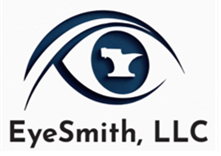EYESMITH, LLC
Prioritizing Good Eyecare for a Healthier Future
Our eyes are windows to the world, enabling us to experience the beauty, wonder, and details of life. Ensuring good eyecare is paramount not only for maintaining clear vision but also for overall health and well-being. Regular eye check-ups can detect early signs of eye conditions and other health issues, such as diabetes and high blood pressure. Let's commit to nurturing our eye health, preserving our vision, and enriching our lives. After all, in the realm of wellness, our sight deserves unwavering attention and care.
OUR SERVICES
Comprehensive Eye Exams Includes
Patient History: The doctor will ask about any current eye or vision problems, overall health, medications, and any family history of eye conditions.
Visual Acuity Test: This measures how clearly each eye can see, often using a reading chart.
Preliminary Tests: These can include evaluations of depth perception, color vision, eye muscle movements, peripheral vision, and pupil response to light.
Keratometry/Topography: These tests measure the curvature of the cornea, which is important for fitting contact lenses.
Refraction: This determines the lens power needed to compensate for any refractive errors (nearsightedness, farsightedness, or astigmatism).
Eye Muscle Movement Test: This checks how well your eyes can follow a moving object and move together.
Pupil Dilation: Drops are used to dilate your pupils, allowing the doctor to examine the retina and optic nerve more thoroughly.
Intraocular Pressure Test: This measures the pressure inside your eyes to check for glaucoma.
Retinal Examination: The doctor examines the back of your eye, including the retina, optic nerve, and blood vessels.
Slit-Lamp Examination: This uses a special microscope to examine the structures at the front of your eye.
Cover/Uncover Test: This checks for alignment issues or strabismus.


Exceptional Eyecare for Everyone
Already Have a Current/Valid Prescription?
Thinking you would like to try Contacts?
Ask about our Contact fitting only.


Eyeglass Prescription
Includes A Comprehensive Eye Exam
GOOD STEPS TO GOOD EYE CARE
Regular Eye Exams: Schedule comprehensive eye exams with an optometrist or ophthalmologist to detect any potential issues early.
Hygiene: Keep your hands and contact lenses clean to avoid infections.
Use Artificial Tears: If you experience dry eyes, use artificial tears to keep your eyes lubricated.
Hydrate: Stay hydrated to maintain moisture in your eyes.
Manage Chronic Conditions: Conditions like diabetes and hypertension can affect your eyes, so keep them under control with proper medical care.
Adequate Sleep: Ensure you get enough sleep to rest and rejuvenate your eyes.
Avoid Smoking: Smoking can increase the risk of eye diseases, so avoiding it can benefit your eye health.
Healthy Diet: Incorporate foods rich in vitamins and minerals, such as leafy greens, carrots, and fish high in omega-3 fatty acids.
Protective Eyewear: Wear sunglasses that block 100% of UV rays to protect your eyes from harmful sunlight. Use safety goggles when working with hazardous materials or playing certain sports.
Proper Lighting: Ensure your work and living spaces are well-lit to prevent eye strain.
Limit Screen Time: Follow the 20-20-20 rule—every 20 minutes, take a 20-second break and look at something 20 feet away to reduce eye strain.
Taking these steps can help preserve your vision and overall eye health. It's all about integrating these habits into your daily routine for long-term benefits.
FAQS
Life coaching is a dynamic and collaborative process focused on helping individuals identify and achieve their personal and professional goals. It involves a series of one-on-one sessions with a trained life coach who provides guidance, support, and accountability. Coaches use a variety of techniques and tools to help clients gain clarity, set actionable goals, and develop strategies to overcome challenges. The coaching process is highly personalized, tailored to each individual's unique needs and aspirations, and it empowers clients to make positive changes in their lives.
The duration of a coaching engagement can vary based on individual goals and needs. Some clients find value in a few sessions focused on specific issues or challenges, while others may engage in longer-term coaching to achieve more substantial personal or professional transformations. Typically, a coaching relationship may last anywhere from a few months to a year or longer. It's essential to discuss your objectives and expectations with your coach to determine the best timeline for your coaching journey.
Call for an Appointment Today!
Find us in Sam's Club
3052 John Hawkins Parkway, Hoover, AL - 205-982-1797
201 Lakeshore Pkwy, Homewood, AL 35209 - 205-942-0896
Monday - Saturday 9:00am to 5:00pm
Closed on Sundays


